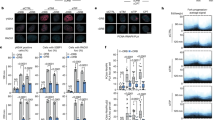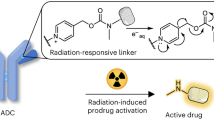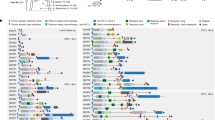Abstract
Philadelphia chromosome (Ph)-positive leukaemia cells express the chimeric bcr/abl oncoprotein, whose deregulated protein tyrosine kinase (PTK) activity antagonizes the induction of apoptosis by DNA damaging agents. Treatment of Ph-positive K562, TOM 1 and KCL-22 cells with etoposide for 2d induced cytosolic vacuolation, but not nuclear condensation or DNA fragmentation. The bcr/abl kinase-selective inhibitor herbimycin A increased the induction of nuclear apoptosis by etoposide or γ-radiation. The concentration of herbimycin required to synergize with etoposide was similar to that required to decrease the level of tyrosine phosphorylated proteins or of the protein tyrosine kinase activity of anti-abl immune complexes in K562 cells. The ability of herbimycin A to sensitize K562, TOM 1 or KCL-22 cells to apoptosis induction correlated with its ability to decrease the cellular content of phosphotyrosyl proteins in these Philadelphia-positive lines. Enhancement of nuclear apoptosis by herbimycin was not attributable to downregulation of the bcl-2 or bcl-XL anti-apoptotic proteins. In contrast, herbimycin protected Philadelphia-negative HL60 cells from apoptosis induction by etoposide and did not affect killing of NC37 and CEM cells. The data suggest that the induction of apoptosis is blocked in cells expressing the bcr/abl oncoprotein and that herbimycin A increases induction of programmed cell death following DNA damage. Selective PTK inhibitors may therefore be of value in securing the genetic death of Ph-positive leukaemia cells.
This is a preview of subscription content, access via your institution
Access options
Subscribe to this journal
Receive 50 print issues and online access
$259.00 per year
only $5.18 per issue
Buy this article
- Purchase on Springer Link
- Instant access to full article PDF
Prices may be subject to local taxes which are calculated during checkout
Similar content being viewed by others
Author information
Authors and Affiliations
Rights and permissions
About this article
Cite this article
Riordan, F., Bravery, C., Mengubas, K. et al. Herbimycin A accelerates the induction of apoptosis following etoposide treatment or γ-irradiation of bcr/abl-positive leukaemia cells. Oncogene 16, 1533–1542 (1998). https://doi.org/10.1038/sj.onc.1201680
Received:
Revised:
Accepted:
Published:
Issue Date:
DOI: https://doi.org/10.1038/sj.onc.1201680
Keywords
This article is cited by
-
Induction of apoptosis by quercetin: different response of human chronic myeloid (K562) and acute lymphoblastic (HSB-2) leukemia cells
Molecular and Cellular Biochemistry (2007)
-
Pharmacological induction of Hsp70 protects apoptosis-prone cells from doxorubicin: comparison with caspase-inhibitor- and cycle-arrest-mediated cytoprotection
Cell Death & Differentiation (2006)
-
Chronic myelogenous leukemia as a paradigm of early cancer and possible curative strategies
Leukemia (2003)
-
A new selective AKT pharmacological inhibitor reduces resistance to chemotherapeutic drugs, TRAIL, all-trans-retinoic acid, and ionizing radiation of human leukemia cells
Leukemia (2003)
-
BCR/ABL regulates response to DNA damage: the role in resistance to genotoxic treatment and in genomic instability
Oncogene (2002)



